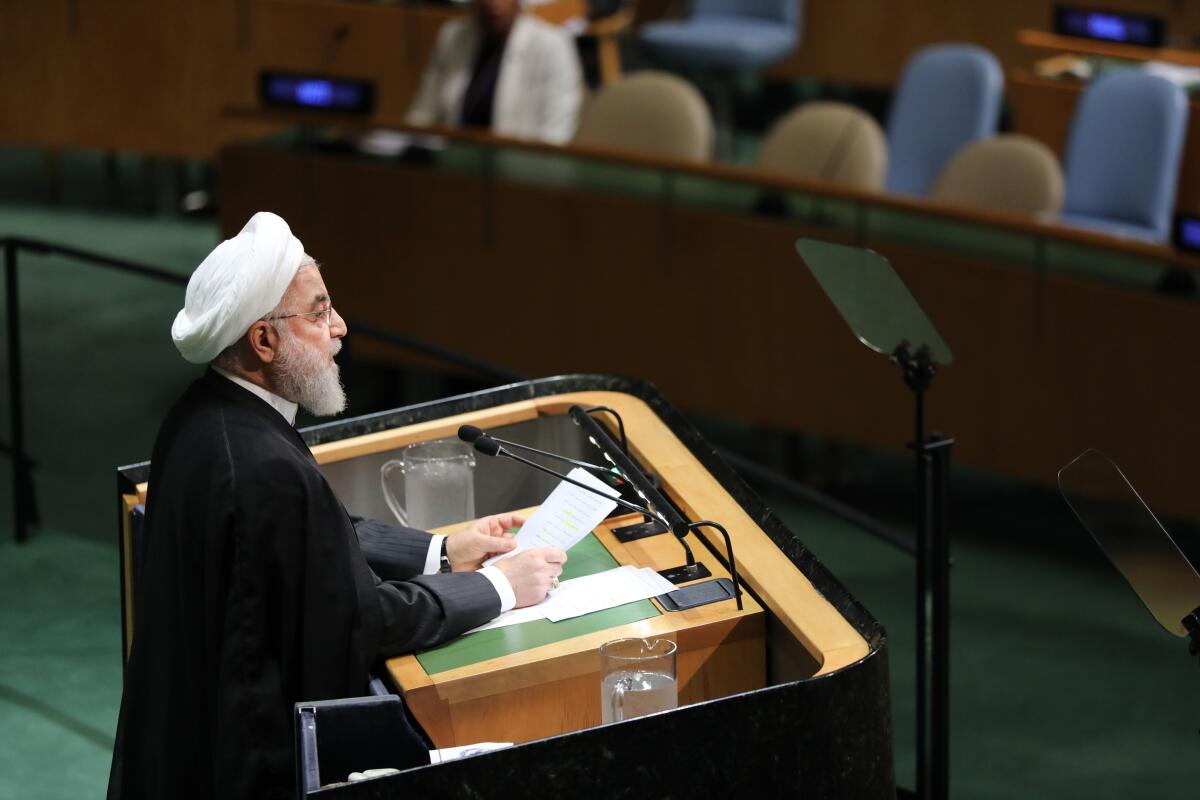Iranian leader at U.N. seems to close the door on talks with Trump

- Share via
UNITED NATIONS — Iranian President Hassan Rouhani on Wednesday ruled out talks with the Trump administration that might quell explosive tensions roiling the Middle East.
Rouhani’s much-anticipated appearance at the United Nations General Assembly came as President Trump renewed hints that he would meet with his Iranian counterpart, despite sharp animosity between the two leaders.
Trump, embroiled in political scandal and facing possible impeachment over his dealings with Ukraine, may be seeking a way to change the subject. Until this week, a possible Iran meeting was the most tantalizing unknown at this meeting of world leaders, but the idea swiftly became overshadowed by the unfolding Ukraine news.
“We cannot trust an invitation to negotiate with people who have claimed to have imposed on us the harshest sanctions in history,” Rouhani said from the podium at U.N. headquarters. Iran “will never negotiate with an enemy that intends to make Iran surrender by means of the weapon of poverty, pressure and sanction.”
After Trump a year ago unilaterally pulled the United States out of the landmark Iran nuclear deal, he reimposed harsh economic sanctions that have steadily strangled Tehran’s economy, blocked oil exports, stoked inflation and triggered the collapse of the Iranian currency.
But tensions between the two countries soared to new heights following a Sept. 14 strike on two critical oil facilities in Saudi Arabia, a surprise attack that Washington and several European countries blamed on Iran. Tehran denied a role in the attack. The Pentagon recently announced it would deploy air and missile defense systems to help protect the kingdom.
Still, Trump on Tuesday evening dangled the possibility of a meeting with Rouhani.
“They would like to negotiate. We haven’t really worked that out,” Trump said. “They’re here. We’re here. But we have not agreed to that yet. They would like to negotiate. It certainly makes sense but we haven’t agreed to that yet.”
Shortly after those remarks, Trump held an unscheduled private meeting with French President Emmanuel Macron, who has hoped to serve as mediator between Washington and Tehran.
But instead of a meeting, Trump returned to Trump Tower and focused on television coverage of House Speaker Nancy Pelosi’s announcement that she was opening an impeachment inquiry.
The drama swirling around Trump took some of the oxygen away from other events at the U.N. summit. Still, Rouhani, who rarely appears in the United States, had points to make.
The Middle East, he said, is “burning in the flames of war, bloodshed, occupation” and sectarian religious strife. But in contrast to the Trump administration, which blames Iran for fanning those flames, Rouhani blamed rivals Saudi Arabia, Israel and the war in Yemen.
He also sought to dispel the view in the West that Iran is increasingly isolated, citing growing cooperation with Russia and Turkey. Especially with Russia, Iran has made inroads in Syria to quell opposition forces, bolster President Bashar Assad and carve out its own territory.
Rouhani’s most pointed criticism was reserved for the U.S. “maximum pressure” campaign against Iran that has included sanctions and diplomatic shunning.
“I hail from a country that has endured the most merciless economic terrorism and has defended its rights to independence,” Rouhani said. The United States has tried to block Iran from the global economy and used diplomacy to block the free movement of Iranian officials in international travel, he said.
“We have never surrendered,” he said.
The Trump administration contends that its pressure campaign has brought the Iranian economy to its knees and will eventually force the Islamic Republic back to a negotiating table. However, some in Trump’s administration, at least privately, harbor a desire for all-out regime change in Iran.
“Our enforcement of sanctions has been and will continue to be relentless,” Secretary of State Michael R. Pompeo said at a separate event Wednesday on the margins of the U.N. General Assembly. He said the administration had succeeded in putting “staggering pressure to bear” on Iran’s petro-chemical industry, metals production and banking.
On Tuesday, at his General Assembly speech, Trump, too, was tough on Iran.
“All nations have a duty to act,” he said. “No responsible nations should subsidize Iran’s blood lust.”
A week ago, a spokesman for the Iranian Foreign Ministry ruled out a meeting between Rouhani and Trump, saying “neither is such a plan on our agenda, nor will such a thing happen.”
Rouhani at the time said he would sit down with Trump only if the crippling economic sanctions that Washington has imposed were eased. Pompeo insisted the punitive measures would not be removed until Iran ended its support for militant groups in the Middle East among other actions, and Trump on Tuesday, in his U.N. address, reiterated that position, saying sanctions would likely be tightened.
France, Germany and Britain, who on Monday joined Washington in blaming the recent Saudi attacks on Iran, have sought to keep the deal alive but are increasingly urging Tehran to look to negotiate a new, more comprehensive deal.
“They call us to negotiations while they run away from treaties and deals,” Rouhani said Wednesday.
More to Read
Sign up for Essential California
The most important California stories and recommendations in your inbox every morning.
You may occasionally receive promotional content from the Los Angeles Times.














